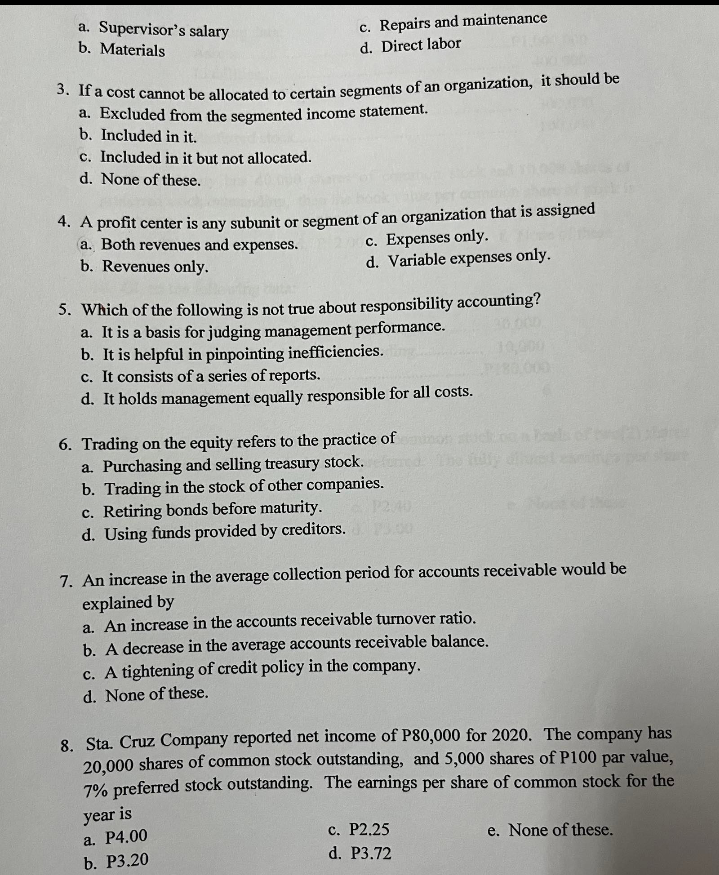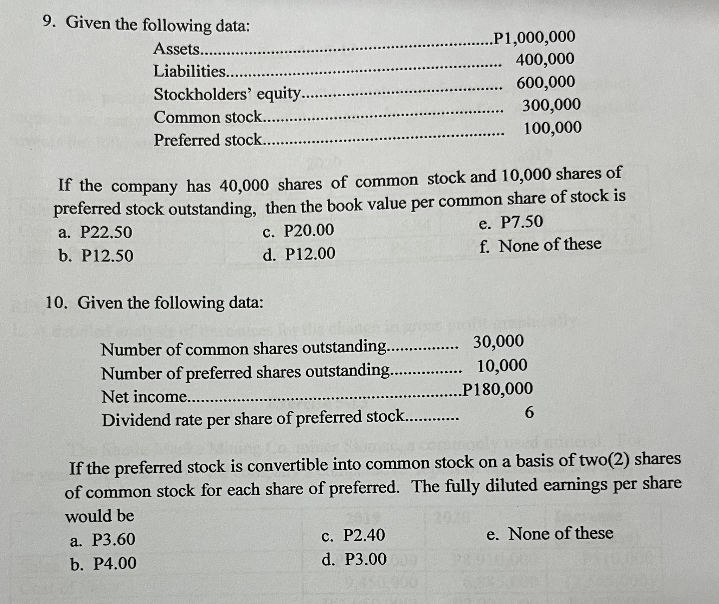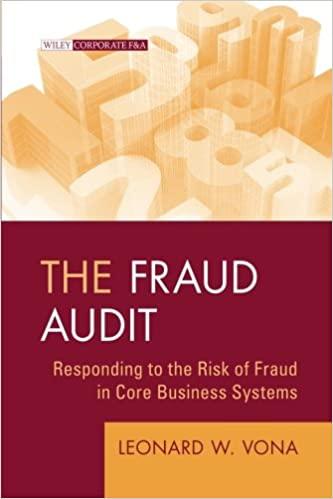Answered step by step
Verified Expert Solution
Question
1 Approved Answer
1. A responsibility center is an organization unit headed by a responsible manager. It is known as a. Cost center c. Investment center. b. Profit


 1. A responsibility center is an organization unit headed by a responsible manager. It is known as a. Cost center c. Investment center. b. Profit center d. None of these. 2. Which of the following items of cost would be least likely to appear in a performance report based on responsibility accounting techniques for the supervisor of an assembly line in a large manufacturing situation? a. Supervisor's salary c. Repairs and maintenance b. Materials d. Direct labor 3. If a cost cannot be allocated to certain segments of an organization, it should be a. Excluded from the segmented income statement. b. Included in it. c. Included in it but not allocated. d. None of these. 4. A profit center is any subunit or segment of an organization that is assigned a. Both revenues and expenses. c. Expenses only. b. Revenues only. d. Variable expenses only. 5. Which of the following is not true about responsibility accounting? a. It is a basis for judging management performance. b. It is helpful in pinpointing inefficiencies. c. It consists of a series of reports. d. It holds management equally responsible for all costs. 6. Trading on the equity refers to the practice of a. Purchasing and selling treasury stock. b. Trading in the stock of other companies. c. Retiring bonds before maturity. d. Using funds provided by creditors. 7. An increase in the average collection period for accounts receivable would be explained by a. An increase in the accounts receivable turnover ratio. b. A decrease in the average accounts receivable balance. c. A tightening of credit policy in the company. d. None of these. 8. Sta. Cruz Company reported net income of P80,000 for 2020 . The company has 20,000 shares of common stock outstanding, and 5,000 shares of P100 par value, 7% preferred stock outstanding. The earnings per share of common stock for the year is a. P4.00 c. P2.25 e. None of these. b. P3.20 d. P3.72 9. Given the If the company has 40,000 shares of common stock and 10,000 shares of preferred stock outstanding, then the book value per common share of stock is a. P22.50 c. P20.00 e. P7.50 b. P12.50 d. P12.00 f. None of these 10. Given the following data: If the preferred stock is convertible into common stock on a basis of two(2) shares of common stock for each share of preferred. The fully diluted earnings per share would be a. P3.60 c. P2.40 e. None of these b. P4.00 d. P3.00
1. A responsibility center is an organization unit headed by a responsible manager. It is known as a. Cost center c. Investment center. b. Profit center d. None of these. 2. Which of the following items of cost would be least likely to appear in a performance report based on responsibility accounting techniques for the supervisor of an assembly line in a large manufacturing situation? a. Supervisor's salary c. Repairs and maintenance b. Materials d. Direct labor 3. If a cost cannot be allocated to certain segments of an organization, it should be a. Excluded from the segmented income statement. b. Included in it. c. Included in it but not allocated. d. None of these. 4. A profit center is any subunit or segment of an organization that is assigned a. Both revenues and expenses. c. Expenses only. b. Revenues only. d. Variable expenses only. 5. Which of the following is not true about responsibility accounting? a. It is a basis for judging management performance. b. It is helpful in pinpointing inefficiencies. c. It consists of a series of reports. d. It holds management equally responsible for all costs. 6. Trading on the equity refers to the practice of a. Purchasing and selling treasury stock. b. Trading in the stock of other companies. c. Retiring bonds before maturity. d. Using funds provided by creditors. 7. An increase in the average collection period for accounts receivable would be explained by a. An increase in the accounts receivable turnover ratio. b. A decrease in the average accounts receivable balance. c. A tightening of credit policy in the company. d. None of these. 8. Sta. Cruz Company reported net income of P80,000 for 2020 . The company has 20,000 shares of common stock outstanding, and 5,000 shares of P100 par value, 7% preferred stock outstanding. The earnings per share of common stock for the year is a. P4.00 c. P2.25 e. None of these. b. P3.20 d. P3.72 9. Given the If the company has 40,000 shares of common stock and 10,000 shares of preferred stock outstanding, then the book value per common share of stock is a. P22.50 c. P20.00 e. P7.50 b. P12.50 d. P12.00 f. None of these 10. Given the following data: If the preferred stock is convertible into common stock on a basis of two(2) shares of common stock for each share of preferred. The fully diluted earnings per share would be a. P3.60 c. P2.40 e. None of these b. P4.00 d. P3.00 Step by Step Solution
There are 3 Steps involved in it
Step: 1

Get Instant Access to Expert-Tailored Solutions
See step-by-step solutions with expert insights and AI powered tools for academic success
Step: 2

Step: 3

Ace Your Homework with AI
Get the answers you need in no time with our AI-driven, step-by-step assistance
Get Started


